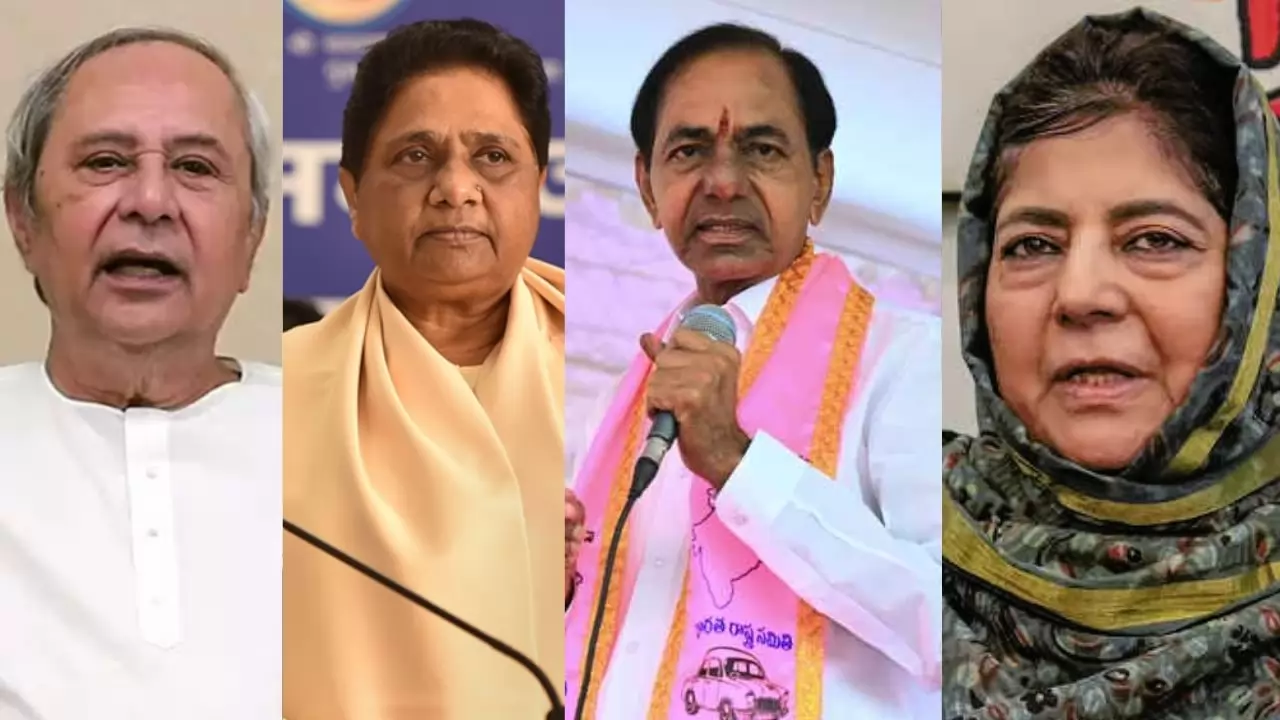
In the dynamic landscape of Indian politics, neutrality has proven to be a perilous path. This timeless wisdom echoed profoundly in the aftermath of the recent Lok Sabha elections, where the electorate decisively shunned parties that opted to remain on the sidelines. As the political winds blew fiercely in favor of the ruling NDA and the opposition India Alliance, the neutral factions found themselves in the eye of a storm, left with nothing but the bitter taste of defeat. Among them were some of the most established names in Indian politics, now facing a stark reality of irrelevance.
One of the most surprising outcomes was for the Biju Janata Dal (BJD), led by Naveen Patnaik. Despite being in power for 24 years in Odisha, the BJD failed to secure a single seat in the Lok Sabha elections. Although the party received 37.53% of the votes in Odisha, their decision to stay neutral cost them dearly.
In the simultaneous assembly elections, the BJD also faced a major defeat. The party managed to win only 51 out of 147 seats, losing 62 seats overall. Chief Minister Naveen Patnaik himself faced defeat on one seat. As a result, the BJP is set to form the government in Odisha, with 78 seats, while Congress secured 14 seats.
The Bahujan Samaj Party (BSP), led by Mayawati, also faced a big setback. In the 2019 Lok Sabha elections, the BSP had allied with the Samajwadi Party (SP) in Uttar Pradesh and won 10 seats. This time, however, Mayawati chose to go it alone, resulting in zero seats for the BSP. The party received 9.39% of the votes in Uttar Pradesh but lost all its previously held seats.
Similarly, in the 2022 Uttar Pradesh assembly elections, the BSP contested alone and won only one seat, highlighting their diminishing influence without an alliance.
K Chandrashekhar Rao's Bharat Rashtra Samiti (BRS) also faced a major defeat in Telangana. The party, which lost its decade-long power in November 2023, could not secure any of the 17 Lok Sabha seats in the state. The BJP and the ruling Congress each won eight seats, while AIMIM's Asaduddin Owaisi retained his Hyderabad seat. The Congress received 40.10% of the votes, the BJP 35.08%, and AIMIM 3.02%.
In Tamil Nadu, the All India Anna Dravida Munnetra Kazhagam (AIADMK) also suffered a defeat, winning zero seats in the Lok Sabha elections. The party, which has historically been an ally of the NDA, chose to remain neutral this time and received 20.46% of the votes. Despite being the main opposition party in the state, their decision to distance themselves from major alliances proved costly.
In a stunning turn of events, former Chief Minister of Jammu and Kashmir and President of the People's Democratic Party (PDP), Mehbooba Mufti, faced defeat in the Anantnag-Rajouri Lok Sabha seat. Running against her was Mian Altaf of the National Conference, who emerged victorious. The National Conference and Congress contested the election as allies, while the PDP decided to go solo. This strategy backfired, as the PDP failed to win any of the five Lok Sabha seats in the state, securing only 8.48% of the vote.
The elections also spelled disaster for the Chautala family in Haryana. Representing two factions of the state’s most influential political lineage—Indian National Lok Dal (INLD) and Jannayak Janata Party (JJP)—the Chautalas decided to contest the elections separately. However, both parties were wiped out. In the Hisar Lok Sabha seat, three members of the Chautala family were in the fray. Among them, Sunaina Chautala and Naina Chautala, candidates from INLD and JJP respectively, couldn't even save their deposits. The once-dominant INLD, previously led by Om Prakash Chautala, and JJP, whose leader Dushyant Chautala was recently the deputy chief minister in a coalition with the BJP, faced complete rejection from the voters.
In Maharashtra, Prakash Ambedkar's Vanchit Bahujan Aghadi (VBA) also faced a crushing defeat, failing to secure any seats. Ambedkar had been in prolonged negotiations with the India Alliance over seat-sharing arrangements. When these talks fell through, he chose to go it alone. This decision proved costly, as Ambedkar himself lost in Akola, and his party came away empty-handed.
Assam’s political landscape also witnessed a major shift as the All India United Democratic Front (AIUDF) saw its influence wane. Once an ally of the Congress, AIUDF failed to secure any seats in the Lok Sabha elections. Party leader Badruddin Ajmal, a prominent figure in the state, lost his Dhubri seat, marking a significant setback for the party.
In Goa, the Revolutionary Goa Party also failed to make an impact, not winning a single seat. This result adds to the growing list of regional parties that were unable to secure a foothold in the Lok Sabha elections.
These examples reflect a broader trend where parties that chose to remain neutral, distancing themselves from both the NDA and India alliances, faced significant losses. The electorate has shown a clear preference for parties that align themselves with either of the two major coalitions, rejecting those who attempted to stay independent.





Copyright © 2026 Top Indian News
